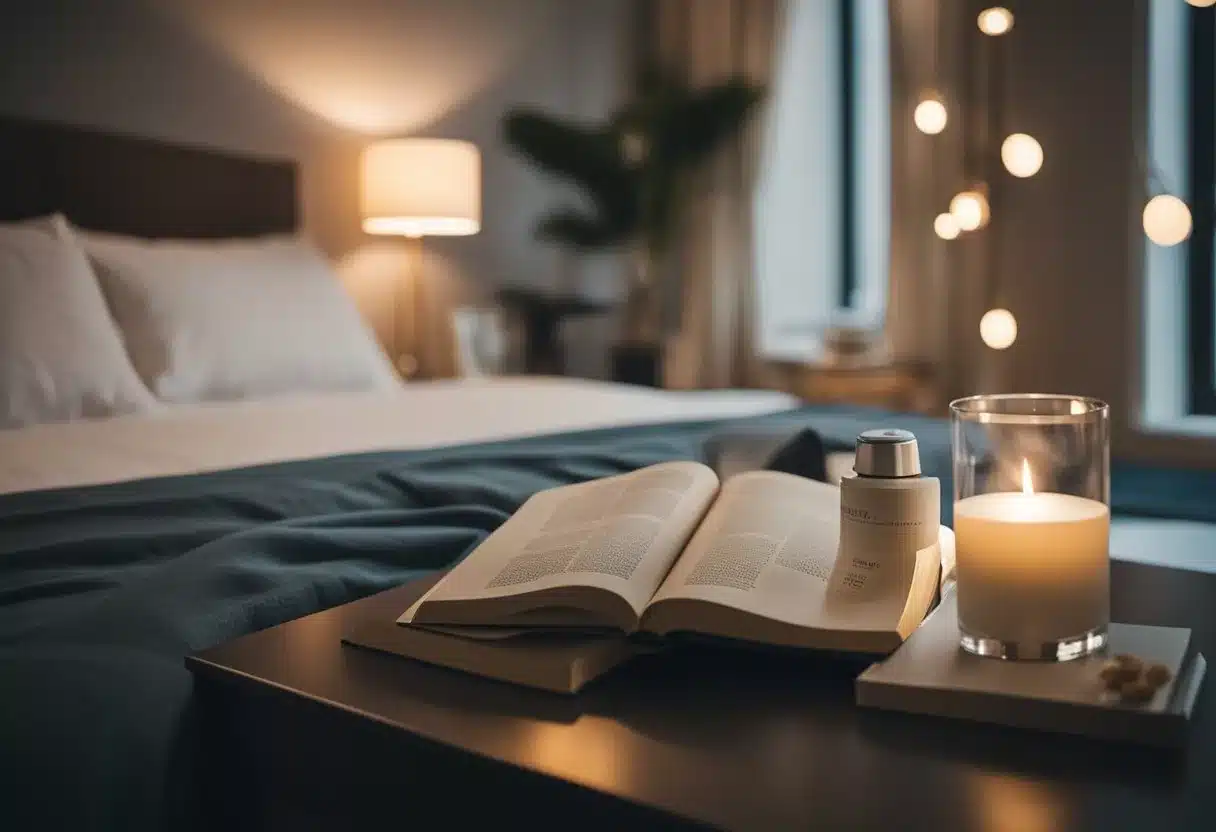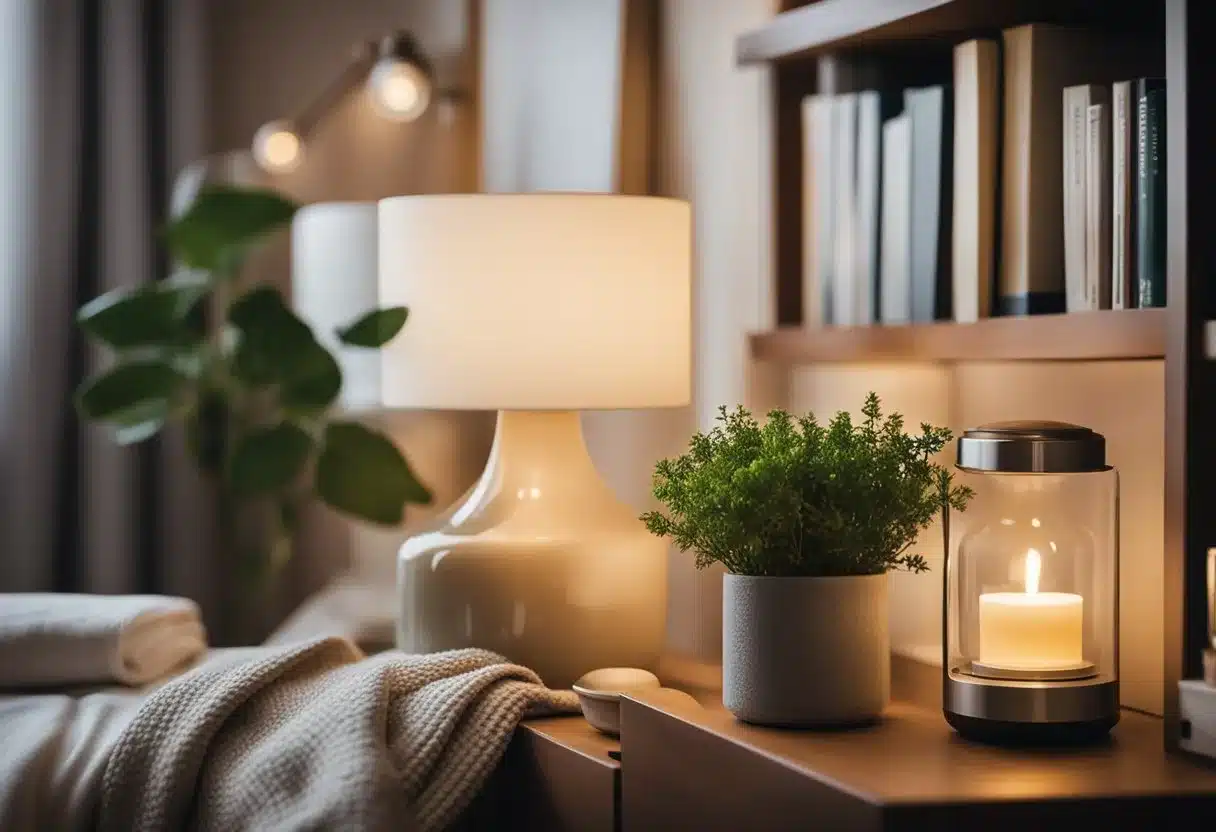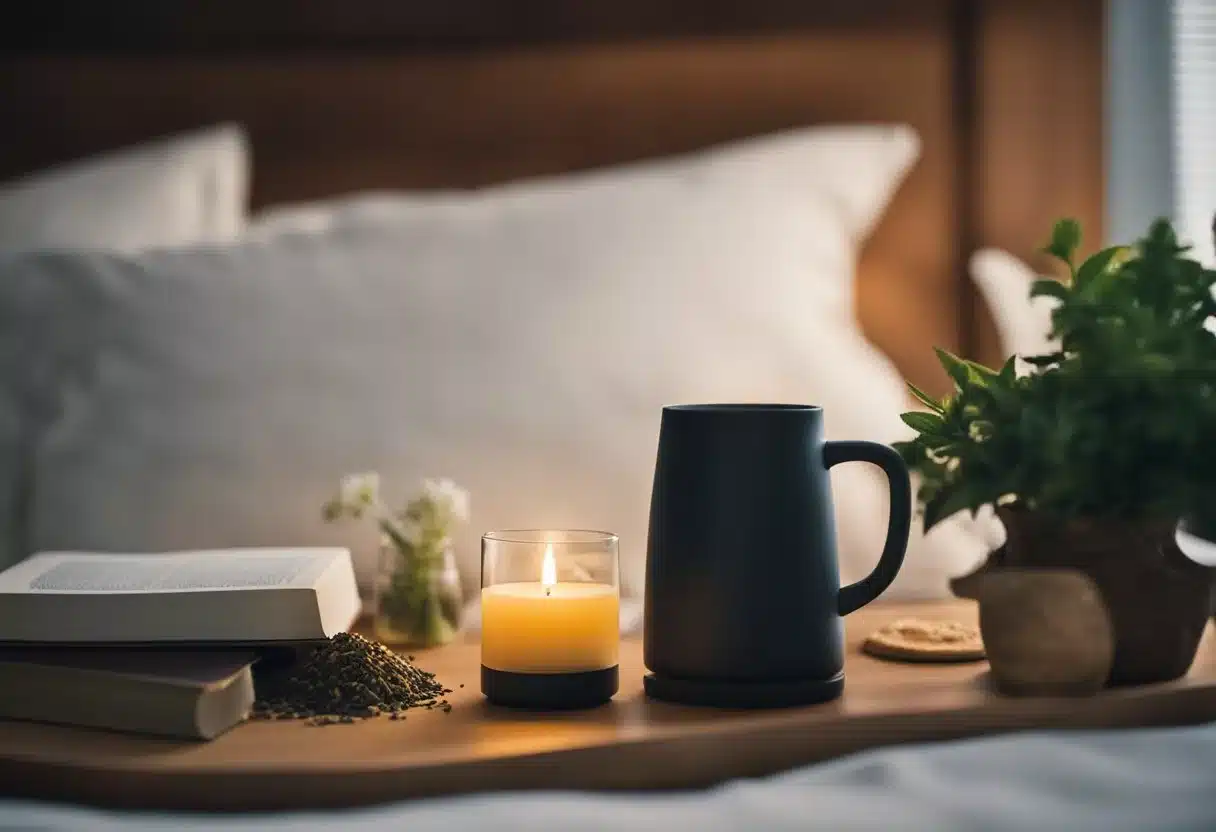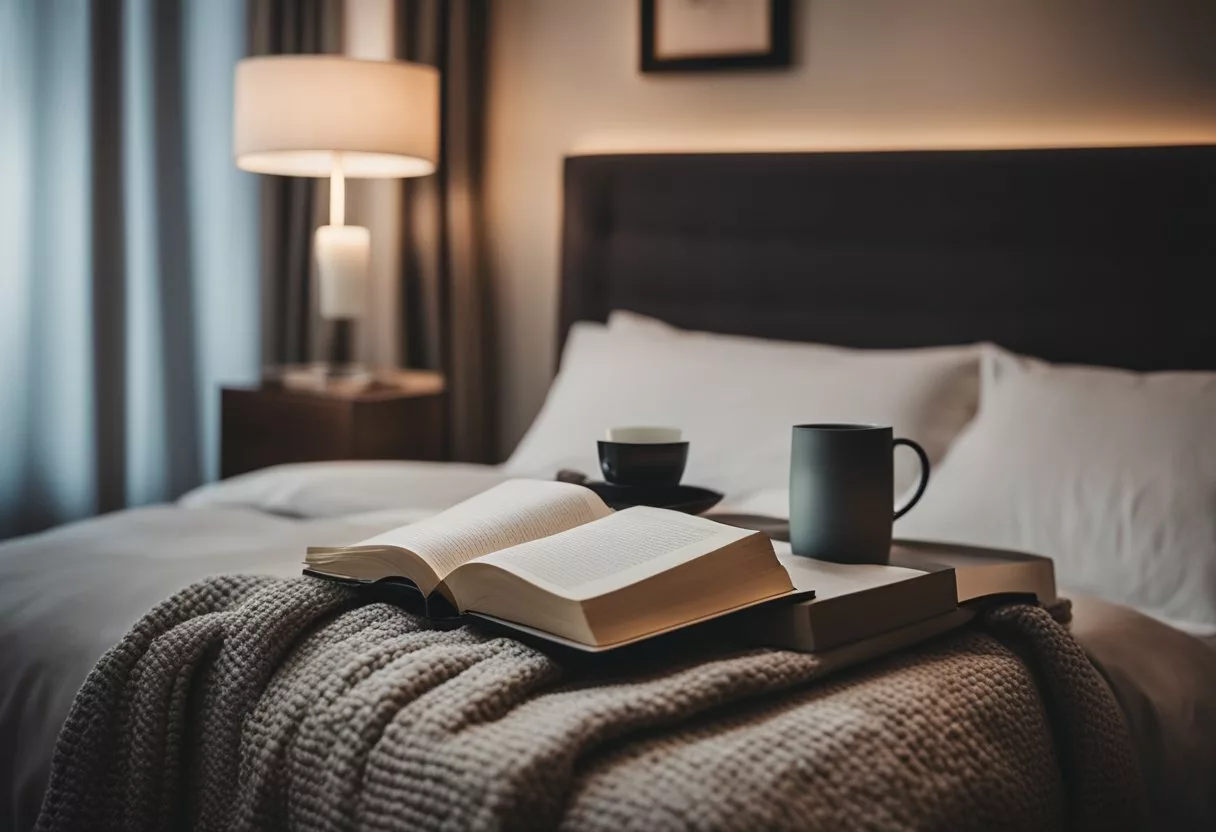Getting a good night’s sleep is crucial for your health and well-being. Many people struggle to fall asleep or stay asleep throughout the night. Establishing a relaxing bedtime routine and creating a sleep-friendly environment can significantly improve your sleep quality.
 [1]
[1]What to do before bed to sleep better:
Watch the video NOW![2]
Simple changes to your evening habits can make a big difference in how well you sleep. Avoiding screens before bed, doing gentle stretches, and practicing relaxation techniques are some effective ways to prepare your body and mind for rest. These methods can help reduce stress and promote better sleep.
Setting up your bedroom for optimal sleep is also important. A cool, dark, and quiet room can help you drift off more easily. Comfortable bedding and a supportive mattress play a role too. By making these adjustments, you can create an ideal space for restful sleep.
Key Takeaways
- A consistent bedtime routine helps prepare the body and mind for sleep
- Creating a sleep-friendly bedroom environment promotes better rest
- Relaxation techniques and gentle stretches can ease the transition to sleep
Sleep Quality

Sleep quality affects our health and daily functioning. Good sleep involves both quantity and quality of rest each night.
The Importance of Consistent Sleep Routine
A consistent sleep routine helps regulate our body’s circadian rhythm. Going to bed and waking up at the same times daily trains our internal clock. This makes it easier to fall asleep and wake up naturally.
Sticking to a routine also improves sleep quality. Our bodies learn to prepare for sleep at the right time. This leads to deeper, more restful sleep cycles.
A good routine includes relaxing activities before bed. Reading, gentle stretching, or listening to calm music can help. Avoiding screens and bright lights in the evening also helps.
How Sleep Disorders Affect Health
Sleep disorders can seriously impact health and quality of life. Common disorders include insomnia and sleep apnea.
Insomnia makes it hard to fall or stay asleep. This leads to daytime fatigue and mood issues. Sleep apnea causes breathing pauses during sleep. It increases risks of heart problems and accidents.
Sleep deprivation from disorders affects many body systems. It can weaken the immune system and impair cognitive function. Lack of quality sleep is linked to weight gain and diabetes risk.
Getting help for sleep disorders is crucial. Treatment can greatly improve sleep quality and overall health.
Creating a Relaxing Environment

A calm bedroom setting promotes better sleep. The right temperature, lighting, and bedding can make a big difference in sleep quality.
Optimizing Bedroom Temperature and Lighting
The ideal sleep temperature is between 60-67°F (15-19°C). Use a thermostat to keep your room cool. A fan can help circulate air and provide white noise.
Darkness is key for good sleep. Use blackout curtains or a sleep mask to block light. Dim lights 1-2 hours before bed to signal your body it’s time to rest.
Avoid blue light from screens before bed. Use warm, low lighting like red night lights if needed.
Choosing the Right Bedding and Mattress
A good mattress supports your body and keeps your spine aligned. Replace mattresses every 6-8 years. Choose one that fits your sleep style and comfort needs.
Bedding affects temperature and comfort. Natural fibers like cotton or bamboo are breathable. Try these options:
- Sheets: 100% cotton, 300-400 thread count
- Pillows: Memory foam or down alternative
- Blankets: Light for summer, heavier for winter
The right pillow keeps your neck aligned. Side sleepers need thicker pillows, while back sleepers need thinner ones.
Evening Habits for Better Sleep

Creating a relaxing nighttime routine can significantly improve sleep quality. The right habits before bed help prepare your body and mind for restful slumber.
Managing Diet and Exercise Before Bed
What you eat and drink in the evening affects sleep. Avoid large meals close to bedtime. They can cause discomfort and disrupt sleep. Limit caffeine after 2 PM. It can stay in your system for hours and make it hard to fall asleep.
Alcohol before bed[3] may make you feel sleepy but often leads to poor quality sleep. It’s best to stop drinking a few hours before bedtime.
Light exercise in the evening can help you sleep better. Try gentle stretching or yoga. But avoid intense workouts close to bedtime. They can be too stimulating.
The Effect of Electronics on Sleep Quality
Electronic devices can interfere with sleep. The blue light from screens tricks your brain into thinking it’s daytime. This makes it harder to fall asleep.
Try to stop using electronics 1-2 hours before bed. If you must use them, use blue light filters or night mode settings.
Instead of scrolling on your phone, try reading a book. It’s a calming activity that doesn’t involve screens.
Keep your bedroom a tech-free zone. This helps your brain associate the room with sleep, not work or entertainment.
Incorporating Relaxation Techniques
Relaxation techniques can promote better sleep. Deep breathing exercises help calm your mind and body. Try taking slow, deep breaths for a few minutes before bed.
Meditation can reduce stress and improve sleep quality. Even a short 5-10 minute session can be beneficial.
Progressive muscle relaxation involves tensing and relaxing different muscle groups. It can help release physical tension before bed.
A warm bath or shower can also be relaxing. The drop in body temperature afterward can make you feel sleepy.
Pre-Sleep Relaxation Practices

Relaxing before bed helps prepare your mind and body for sleep. Calm activities like deep breathing, meditation, reading, and listening to music can reduce stress and promote better rest.
Deep Breathing and Meditation Techniques
Deep breathing exercises help slow your heart rate and relax tense muscles. Try this simple technique: breathe in slowly through your nose for 4 counts, hold for 4, then exhale for 4. Repeat 5-10 times.
Meditation before bed can quiet racing thoughts. Start with just 5 minutes of mindfulness meditation. Focus on your breath or do a body scan, noticing sensations from head to toe.
Guided imagery is another helpful practice. Visualize a peaceful scene like a beach or forest. Engage all your senses – imagine the sights, sounds, smells, and textures of your calm place.
The Benefits of Reading and Listening to Music
Reading a book or listening to soothing music are great ways to wind down. These activities shift focus away from daily stresses.
Choose light, enjoyable reading material. Avoid intense or scary stories that may be too stimulating. Use dim lighting and read for 15-30 minutes.
Soft, slow music can lower blood pressure and heart rate. Classical, jazz, or nature sounds work well. Keep the volume low. Listening for 30-45 minutes may improve sleep quality.
Audiobooks combine the benefits of reading and listening. They occupy the mind while allowing eyes to rest in darkness.
Physical Activities to Alleviate Tension

Doing light exercises before bed can help you relax and sleep better. These activities ease muscle tension and calm your mind.
Gentle Stretching and Yoga Poses
Stretching is a great way to release tension in your body. Focus on areas that often hold stress, like your neck, shoulders, and lower back. Try a simple neck roll by slowly moving your head in circles.
For your shoulders, gently pull one arm across your chest and hold. Switch sides. To stretch your lower back, lie on your back and hug your knees to your chest.
Yoga can also help. The child’s pose is calming and stretches your spine. Kneel on the floor, sit back on your heels, and reach your arms forward.
Bedtime stretches can improve sleep quality. They make it easier to fall asleep and enjoy deeper rest.
Progressive Muscle Relaxation for Better Sleep
This technique involves tensing and relaxing different muscle groups. It helps you notice the difference between tension and relaxation in your body.
Start with your toes. Curl them tightly for 5 seconds, then relax. Move up to your calves, thighs, and so on, all the way to your face.
For your chest and upper body, take a deep breath and hold it while tensing these muscles. Then exhale and relax.
This exercise can turn off the stress response in your body. It activates the relaxation response instead, making it easier to drift off to sleep.
Nighttime Routines to Enhance Sleep

A good bedtime routine helps prepare your body and mind for sleep. It can reduce stress and signal to your brain that it’s time to wind down.
Developing a Consistent Bedtime Ritual
Create a relaxing routine you follow each night before bed. This helps train your body to recognize when it’s time to sleep.
Start by setting a consistent bedtime. Go to bed and wake up at the same times every day, even on weekends.
About an hour before bed, dim the lights and avoid bright screens. The blue light from devices can disrupt sleep hormones.
Try calming activities like:
- Reading a book
- Listening to soft music
- Taking a warm bath
- Gentle stretching
- Deep breathing exercises
Make your bedroom cool, dark, and quiet. Use earplugs or a white noise machine if needed.
Preparing for the Next Day to Reduce Stress
Planning ahead can ease worries that keep you up at night. Take a few minutes each evening to get ready for tomorrow.
Make a short to-do list for the next day. This helps clear your mind of tasks you might forget.
Lay out clothes and pack any bags you’ll need. Prepare lunch if you take it with you.
Check your schedule and set out anything you’ll need for appointments or errands.
Writing in a gratitude journal before bed can promote calm feelings. List a few things you’re thankful for from your day.
These simple steps can reduce morning stress and help you relax at night.
Adapting to Physical Needs and Discomfort

Physical discomfort can greatly impact sleep quality. Addressing pain and adjusting posture are key for better rest.
Strategies for Managing Pain and Discomfort during Sleep
Pain can make sleep difficult. To ease discomfort, try stretching before bed. Gentle stretches can relax tense muscles and prepare the body for sleep.
Heat or cold therapy may help. Use a heating pad for sore muscles or an ice pack for inflammation. Limit use to 15-20 minutes at a time.
A supportive mattress and pillow are vital. Memory foam or latex mattresses can reduce pressure points. Pillows should keep the neck aligned with the spine.
For back pain, place a pillow under the knees when lying on the back. This eases pressure on the lower back.
Over-the-counter pain relief may help if approved by a doctor. Take as directed before bed.
Adjusting Positions and Posture for Quality Sleep
Good sleep posture keeps the spine aligned. This reduces strain on muscles and joints.
For side sleepers, place a pillow between the knees. This aligns the hips and reduces lower back stress.
Back sleepers should use a thin pillow to support the natural curve of the neck. Avoid pillows that push the head forward.
Stomach sleeping can strain the neck and back. If needed, use a thin pillow under the hips to reduce lower back arch.
Stretching the upper back and trapezius muscles[4] before bed can ease tension. Gently roll the shoulders and neck.
Proper daytime posture matters too. Sit with feet flat, back supported, and shoulders relaxed. Take breaks to stand and stretch.
Frequently Asked Questions

Natural remedies, diet changes, and bedtime practices can improve sleep quality. Specific techniques help manage anxiety and prevent nighttime waking. The right pre-bed routine leads to feeling refreshed in the morning.
What natural remedies aid in better sleep at night?
Gentle stretching before bed can relax muscles and promote better sleep. A warm bath or shower may also help the body prepare for rest.
Herbal teas like chamomile or valerian root are popular natural sleep aids. Some people find lavender essential oil or a lavender-scented pillow spray calming.
Are there foods or a diet that can promote improved sleep quality?
Foods high in tryptophan, like turkey, milk, and nuts, may support sleep. Eating a light snack with complex carbs and protein can stabilize blood sugar overnight.
It’s best to avoid heavy meals, caffeine, and alcohol close to bedtime. These can disrupt sleep patterns and quality.
What practices can help in falling asleep quickly and efficiently?
Creating a consistent bedtime routine signals the body it’s time for sleep. This might include dimming lights and doing calming activities.
Deep breathing exercises or meditation can quiet a busy mind. Some find counting backwards from 100 or visualizing a peaceful scene helpful.
Can certain activities help prevent waking up in the middle of the night?
Limiting fluid intake before bed can reduce nighttime bathroom trips. Keeping the bedroom cool and dark promotes uninterrupted sleep.
Using white noise or earplugs can block out disruptive sounds. A comfortable mattress and pillows also support continuous sleep.
How can someone with anxiety improve their sleep?
Writing in a gratitude journal[5] before bed can shift focus to positive thoughts. Progressive muscle relaxation helps release physical tension from anxiety.
Some find cognitive behavioral therapy techniques effective for managing anxious thoughts at bedtime. Regular exercise during the day can also reduce anxiety and improve sleep.
What steps can be taken before bed to wake up feeling refreshed?
Setting a consistent wake-up time, even on weekends, helps regulate the body’s internal clock. Exposure to bright light during the day supports this natural rhythm.
Avoiding screens for an hour before bed prevents blue light from disrupting sleep hormones. Preparing for the next day can also reduce morning stress and promote better rest.
References
- Bizarre Salt Water Trick To Dissolve Belly Fat Fast. https://5ae58xkq1t8w3xfer7pk8n7yez.hop.clickbank.net?lid=1&tid=beforebed1 Accessed October 23, 2025
- Bizarre Salt Water Trick To Dissolve Belly Fat Fast. https://5ae58xkq1t8w3xfer7pk8n7yez.hop.clickbank.net?lid=1&tid=beforebed2 Accessed October 23, 2025
- 23 Tips for Your Ideal Nighttime Routine. https://www.healthline.com/health/nighttime-routine Accessed October 23, 2025
- 14 Stretches to Do Before Bed for Better Sleep. https://www.sleepfoundation.org/sleep-hygiene/stretching-before-bed Accessed October 23, 2025
- Writing in a gratitude journal. https://www.realsimple.com/nighttime-habits-for-better-sleep-7503563 Accessed October 23, 2025
